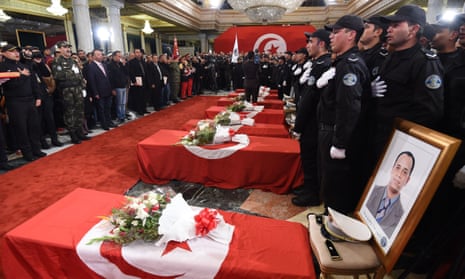Islamic State has claimed responsibility for an attack that left 13 people dead in the centre of Tunis.
The body of a suspected suicide bomber was found at the scene of Tuesday’s attack on a bus carrying Tunisia’s presidential guard. The interior ministry said the bombing involved about 10kg (22lb) of military explosives.
Isis posted a statement online on Wednesday saying a militant it had identified as Abu Abdullah al-Tunisi carried out the attack.
The interior ministry said the 13th body found on the bus was believed to be the “terrorist who caused the explosion”.
The blast rattled the country after a particularly violent year in which two major attacks by jihadi extremists targeted tourist sites.
If Isis was behind the bus blast, it is the latest of several major attacks in Europe and the Middle East aimed at seeding terror beyond its base in Syria and Iraq.
The Tunisian attack came days after authorities visibly increased security in the capital and deployed security forces in unusually high numbers. The government declared the blast a terrorist attack and imposed a 30-day nationwide state of emergency, with troops deployed across the capital.
The US state department denounced the attack and the UN security council pledged support for Tunisia’s young democracy, which is regarded as a model for the region.
Iyad Madani, the secretary general of the Organisation of Islamic Cooperation, the world’s largest bloc of Muslim-majority countries, expressed his solidarity with Tunisia and said such acts of terrorism were seeking to alter the country’s “moderation and tolerance-driven model of society”.
